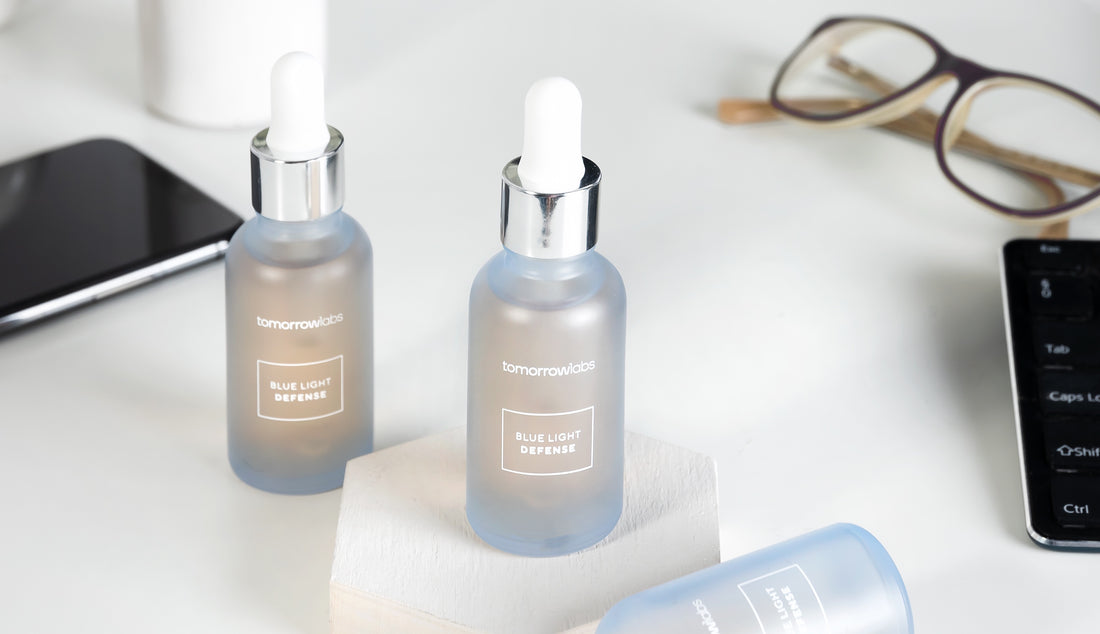
How does blue light damage the skin?
Blue light - HEV (High Energy Visible Light) is emitted by the sun, energy-saving lighting and screens of electronic devices such as telephones, computers, tablets, and televisions. Excessive exposure to blue light can be harmful. It causes disturbances in the circadian rhythm, insomnia and hormonal imbalance. Blue light has a destructive effect on the retina and skin. It leads to eye damage and skin photoaging.
Digital aging
Digital aging is a term that describes skin aging caused by exposure to blue light emitted by electronic devices. Nowadays, exposure to HEV is very high and continues to grow due to the development of digitization. The skin of the face is exposed to blue light for several hours a day. HEV penetrates the skin deeper than UV radiation and induces the formation of free radicals. Research shows that blue light has a more destructive effect on the skin than UVA and UVB radiation. Free radicals cause inflammation and damage the collagen fibers in the skin. They intensify the production of melanin and the appearance of discoloration. By causing oxidative stress, HEV additionally slows down repair processes in the skin and causes DNA damage. Excessive exposure to blue light leads to the loss of skin elasticity, the appearance of mimic wrinkles, overproduction of sebum and skin redness.
How to protect your skin from blue light?
First of all, to lower the impact of harmful blue light on our health, it is essential to reduce the time spent in front of the screens of electronic devices.
To protect the skin, when using HEV emitting devices, use skincare products with active ingredients that block blue light, such as ectoin. Ectoin was discovered as the self-defense and survival substance of microorganisms living in a salt lake. It is a stress-protection agent, which protects microorganisms and plants from extreme conditions of their habitats like salt lakes, hot springs, arctic ice, the deep sea or deserts. Ectoin shows several scientifically proven effects. It has anti-inflammatory and moisturizing properties. Ectoin reduces redness and hyperpigmentation. Finally, it provides photo-protection on the cellular level, including HEV, UV and IR rays.
The new Tomorrowlabs BLUE LIGHT DEFENSE is a high-dose hyaluronic acid serum with ectoin. It provides daily protection from blue light damage, long-lasting hydration and a visible plumping effect.
Additionally, it is worth introducing cosmetics containing antioxidants such as vitamin C. Tomorrowlabs VITAMIN C ESSENCE is a serum with the optimal 5% vitamin C concentration. It reduces uneven pigmentation, tightens the skin, and protects against free radicals formed when exposed to blue light. In addition, vitamin C stimulates collagen production, which is broken down by the harmful effects of HEV.
Finally, you should obtain an antioxidant effect from the inside out by following a diet rich in fruit and vegetables. They contain many vitamins and polyphenols that neutralize free radicals and their harmful effects. To support the fight against free radicals from the inside, we recommend Tomorrowlabs HSF HAIR & NAIL CAPSULES. They contain Astaxanthin, one of the strongest known antioxidants. A lot of support will also be provided by Tomorrowlabs HSF SKIN CAPSULES with collagen and antioxidant compounds such as Cucuma and Astralagus extract, Omega-3 acids and Vitamin C.
Nowadays, it is almost impossible to avoid overexposure to blue light, which causes accelerated photoaging of the skin and loss of its elasticity. It is worth minimizing the use of devices that emit large amounts of HEV for the skin's health. When using electronic devices, protect your skin with a skincare regimen containing blue light protection and antioxidants. Remember to support your body also from the inside with a diet rich in vitamins and polyphenols that will minimize the effects of free radicals induced by high exposure to HEV.